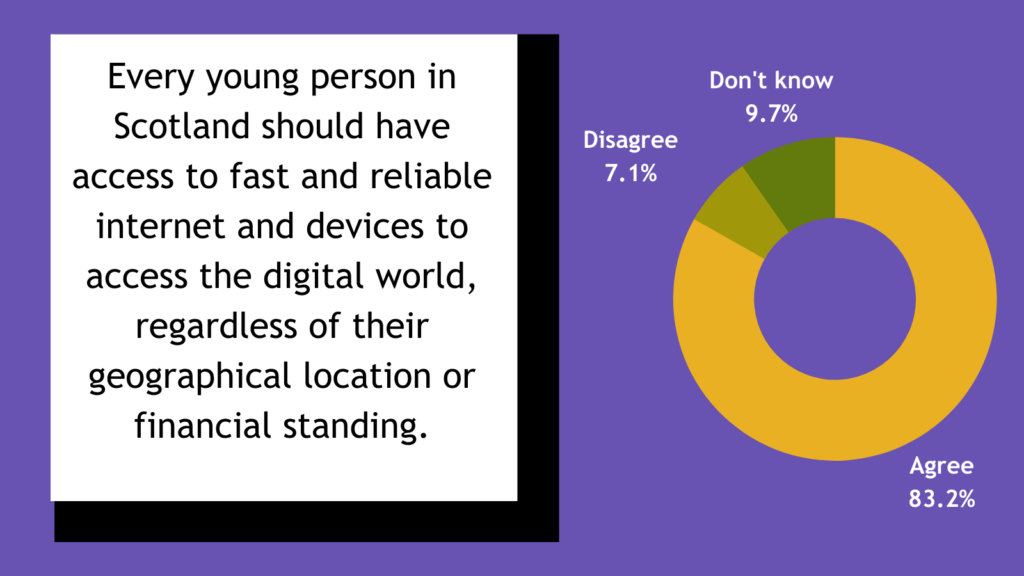A rights-based recovery
We asked Scotland’s young people if they felt that ‘Children and young people’s rights should be at the forefront of decisions made during the COVID-19 crisis and recovery process.’ Overall, 68.5% agreed, 14.5% disagreed, and 17% said they didn’t know. To support this, we ask young people from seldom heard groups such as young people with experience of the criminal justice system, disabled young people, or young people in the armed forces to provide anonymous quotes that share their thoughts on the COVID-19 pandemic and these policies.
If [SYP] weren’t so kind to give us a top up I wouldn’t have been able to make [this focus group]. [Without credit,] you lose access to friends, family and support networks. I get 4GB of data to last a month. That’s one Zoom call and it’s gone. The impact is, I can’t access college, I can’t access all these different things. Even getting online to check the symptoms, I wouldn’t have got a test for COVID if I didn’t go online and look through the NHS guide.
– Young person with experience of the criminal justice system
Expanding digital inclusion
Through our predominately online survey of Scotland’s young people we asked if ‘Every young person in Scotland should have access to fast and reliable internet and devices to access the digital world, regardless of their geographical location or financial standing.’ 83.2% agreed, 7.1% disagreed, and 9.7% didn’t know.
Lowering the educational attainment gap
Next on the COVID-19 crisis, we asked if ‘The Scottish Government should work to lower the educational attainment gap and ensure that young people’s academic achievements aren’t negatively impacted by the COVID-19 crisis.’ 84.3% agreed, 3.8% disagreed, and 11.9% didn’t know.
I understood the rules at the beginning of lockdown. They felt basic, simple and easy to follow. But as we started to go through the phases, that’s when I started to lose track.There was a rule about this, but also a rule about this and this and the next thing.
– Armed forces young person
Youth-friendly public bodies
We also asked Scotland’s young people if ‘Public bodies (such as the NHS, the SQA and Police Scotland) should work with young people to ensure that information is made available in a youth-friendly and accessible manner.’ 86.4% agreed, 3.5% disagreed, and 9.7% didn’t know.
They should also ensure that young people’s views are taken into account when making decisions that affect them.
– Armed forces young person
All of the people who are sitting Highers this year have never sat an SQA exam in their senior education, so sending us all into the exam hall after COVID, after finding out these exams counts for everything, we’re all going to end up freaking out because we’ve never sat an exam before. I don’t think they’ve thought about the impact it’s going to have on our mental health.
– Armed forces young person
Expanding youth employment opportunities
Because of the impact of the COVID-19 pandemic on young people’s opportunities, we asked Scotland’s young people if ‘Policies and initiatives should be created to ensure that young people have good employment prospects throughout the recovery from the COVID-19 crisis, such as youth employment schemes, work experience initiatives and skills development programmes.’ Overall, 84.3% agreed, 3.8% disagreed, and 11.9% didn’t know.
Changing recruitment policies to account for the COVID-19 pandemic
Finally, on the COVID-19 crisis, we asked if ‘Colleges, universities and employers should amend their admissions and recruitment policies to ensure young people whose grades and/or work experience were affected by the COVID-19 crisis are not penalised.’ Overall 84.3% agreed, 3.8% disagreed, and 11.9% didn’t know.
It’s impacted me quite negatively. I lost my job in March […] which had a knock-on effect for rent […]
– A disabled young person
It’s been quite a difficult last six months for myself personally my mental health has gone downhill because I’ve not had the chance to socialise with people.
– A disabled young person
Putting Rights at the Heart of the COVID-19 Recovery
Every year since 2016, MSYPs and MCPs have met with the Scottish Cabinet to discuss the issues that matter most to children and young people in Scotland. At the Cabinet Takeover meeting in March 2021, Mollie McGoran called on the Cabinet to put young people’s rights at the heart of the COVID-19 recovery. Here’s part of Mollie’s speech or you can read the full speech by clicking here.
“Children and young people’s rights should be at the heart of decisions made during the COVID-19 recovery process.
This statement underpins everything we are trying to accomplish here today. It is also at the centre of our Bounce Back campaign, which calls on the Scottish Government and local authorities to take a Human Rights Based approach to recovery from the pandemic. This campaign addresses five main areas of young people’s lives that have been particularly affected over the past year – mental health, education, youth work, jobs and economy, and poverty, all of which are underpinned by young people’s access to their rights.
I’d like to look at the immediate solutions young people would like to see in relation to some of these issues, specifically focusing on digital exclusion and the impact of the pandemic on young people’s mental health.
The past year has greatly increased the world’s reliance on technology, and as a result we need to acknowledge that the lack of universal access to strong and reliable broadband is exacerbating existing social inequalities. As a rural young person living in the highlands, I know first-hand the struggles that can come with living off the beaten track. The costly travel expenses, the lack of opportunities compared to those in urban areas, and the terrible, terrible wifi. Whilst the Scottish Government has taken steps to try to address this in rural areas, such as through R100 and covid-specific programmes, we believe more urgent action is required.
However, it is not just rural young people who have faced digital exclusion this year. Many young people living in areas of deprivation, and those who already experience social exclusion, have been further excluded by the lack of online access. A young person with experience of the criminal justice system told us ‘Without credit, you lose access to friends, family and support networks. I get 4GB of data to last a month. That’s one Zoom call and it’s gone. The impact is, I can’t access college, I can’t access all these different things.“



















